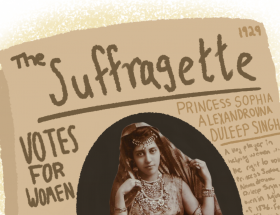When we think of feminist figures, very few people call to mind Ṭàhirih, a woman born in Iran in 1817. Born Fátimih Baraghání, she is more widely known by her title Tahirih, طاهره, meaning ‘The Pure One’, which was given to her by Baha’u’llah the founder of the Bahà’í faith, the religion that she adhered to. As a Bahà’í myself, with a Persian background, the story of Ṭàhirih, and the things she achieved despite living in an age of suppression, has deeply influenced me.
From a young age, she refused to conform to the expectations of women of her time. Her faith taught her to read and write, a knowledge that girls at the time didn’t get. With this, she gained prominence as a poet and a theological scholar in a time where there was no arena for women’s intellectualism. She was known to be both intelligent and beautiful. In fact, the Shah of Iran wanted to marry her at one time. However, by the age of 13, Tahirih was married to a man she would later divorce. This divorce is perhaps one of the first instances of her striking bravery.
It was this boldness that has come to characterize accounts of Ṭàhirih’s life. One of the most spectacular moments of her life, and one that resounds even now, is the story of her unveiling. Ṭàhirih attended a conference in Badasht, in 1848. This conference was filled with men of the Bábi religion and one wherein women were not allowed to attend. At this time, wearing the veil was compulsory. In fact, women were not allowed to leave their homes without full body coverage and escorted by a man. Her mere attendance at the conference was a remarkable insight into her progressiveness and desire for change.
At the conference, she was in a room alongside many members of the Babi Faith. The Bábi Faith was a new religion, only revealed years earlier by the Báb in 1844. The primary aim of the Báb was to signal the coming of a new Messenger: Baha’u’llah, who was to bring a new faith founded on principles of unity, peace and reform. The Báb’s message signaled that it was time to make progress in liberating women. For Ṭàhirih, as well as many others, the compulsory law that enforced the wearing of the veil was a symbol of oppression. Thus, surrounded by men, Ṭàhirih removed her veil.
Her action was shocking. Many did not know where to look or how to react. It has been said, though this is not proven, that one man was so overwhelmed by the action that he slit his own throat, horrified by the sight of a woman’s unmasked face.
The sheer magnitude of this event did not escape the authorities, who promptly arrested her before scapegoating and imprisoning other Bábis. Many of them were put to the death and Ṭàhirih was included.
Even in this, she was defiant. On the day of her execution, She wore her finest perfume, jewelry and clothing in a way somewhat reminiscent of Cleopatra. It is said that despite the fact that she was the one facing death, it was her executioners that seemed afraid – their threat and strength undermined by her defiant acceptance of her fate. Her burial was unceremonious, thrown into a well and covered in stones.
However, even the execution of Ṭàhirih could not weaken her legacy as the authorities had hoped. Her poetry is widely read and the story of her unveiling lives on in memory. Indeed, she is often used in Iran as an example of female liberation. In 2003, the Persian scholar Azar Nafisi recounted her story on PBS’s NewsHour programme: “The first woman to unveil and to question both political and religious orthodoxy was a woman named Tahireh who lived in the early 1800s… And we carry this tradition.” In Iran today, women continue unveiling in protest against coercive laws that deny them the choice to appear in public as they wish.
Despite attempts to silence and condemn her, Ṭàhirih’s legacy lives on not just as a figure that defied convention and tradition, but as someone who embodied fearlessness and bravery in the face of oppression and cruelty. Her example continued to inspire me, and I’m sure many others.




